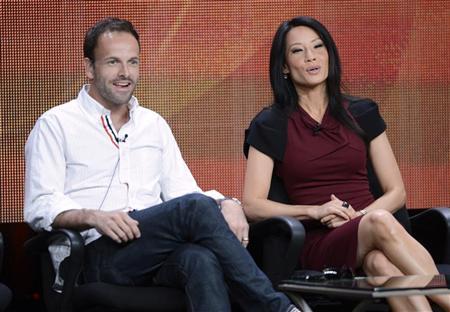(Reuters) – How many times can Sherlock Holmes be reinvented?

At least once more, judging by the latest TV incarnation of the British detective created by Sir Arthur Conan Doyle more than 120 years ago.
“Elementary,” which debuts on CBS on Thursday, puts a modern twist on the classic tale by casting British actor Jonny Lee Miller as a recovering drug addict living in New York, and Lucy Liu as his rare – but far from first – female sidekick, Dr. Joan Watson.
The part-crime, part character-driven U.S. show follows hundreds of movies, TV series and books about, or inspired by, the eccentric amateur London detective with superb logical skills and his long-suffering friend.
In just the last few years, Holmes has spawned two hit movies with Robert Downey Jr. as a cheeky 19th-century action hero, and the BBC’s award-winning modern day miniseries “Sherlock,” starring Benedict Cumberbatch.
Holmes also inspired the character of brilliant but cantankerous diagnostician Dr. Gregory House (Hugh Laurie) in the TV medical series “House.”
According to Guinness World Records, Sherlock Holmes is the most portrayed character in movie history, with his first screen appearance dating back to 1900.
“This guy has got about as identifiable a brand as you could ever ask for. Everyone knows immediately what he means, and what he stands for. It’s like Superman, you could keep on remaking this for every new age,” said Robert Thompson, professor of popular culture at Syracuse University.
“Many of the Sherlocks we have seen are far separated from the one Conan Doyle created. But you can still use that general skeletal framework, and then every five years or so you dress him up in a new set of clothes,” Thompson told Reuters.
ADDICTED TO DRUGS AND PUZZLES
Rob Doherty, the creator of “Elementary” and a longtime fan of Conan Doyle, says he sees the fingerprints of Sherlock Holmes on almost every modern TV crime show.
Doherty’s version focuses on Holmes as an addict – not just to the cocaine mentioned in the original books, but also to puzzle solving in general.
“I think in many senses, he has an addictive personality … . The original Sherlock dabbled with cocaine, dabbled with opiates,” Doherty told television journalists last month.
“Our Sherlock had those same problems but I think one of the big differences is that our Sherlock hit a serious wall,” he said. “He has emerged with just a tiny kernel of self-doubt where one previously never existed.”
Liu, who previously starred in the two movie versions of “Charlie’s Angels,” is hired to be the “sober companion” of Holmes and plays Watson as a disgraced former surgeon with her own flaws and mystery.
“She’s just as unstable (as Holmes) but just not as obvious because she is trying to distract her own problems with his problems,” Liu told reporters in August.
The actress is not the first woman to inhabit Watson. Margaret Colin, Debrah Farentino and Jenny O’Hara have played the Watson role in three separate TV movies since the 1970s.
“Elementary” is getting strong early reviews and popping up on lists of the best shows debuting on U.S. television in the next few weeks.
Tim Goodman with The Hollywood Reporter called it “one of the most promising dramas this fall season,” while Washington Post TV critic Hank Stuever said it “exhibits enough stylish wit in its mood and look to quickly distinguish itself from the latest British ‘Sherlock’ series.”
While strong brand identity can be an advantage, it can also work the other way.
“You already have more than a century of promotion of this name. Everyone knows you are talking about a great detective,” said Thompson.
“But, as a 50-something male, when I hear Sherlock Holmes, I think of black-and-white movies and a guy in this British, crazy outfit, and it doesn’t immediately make me want to go and see the new movie or the new TV show. It seems kind of fusty.”
(Editing by Xavier Briand)



